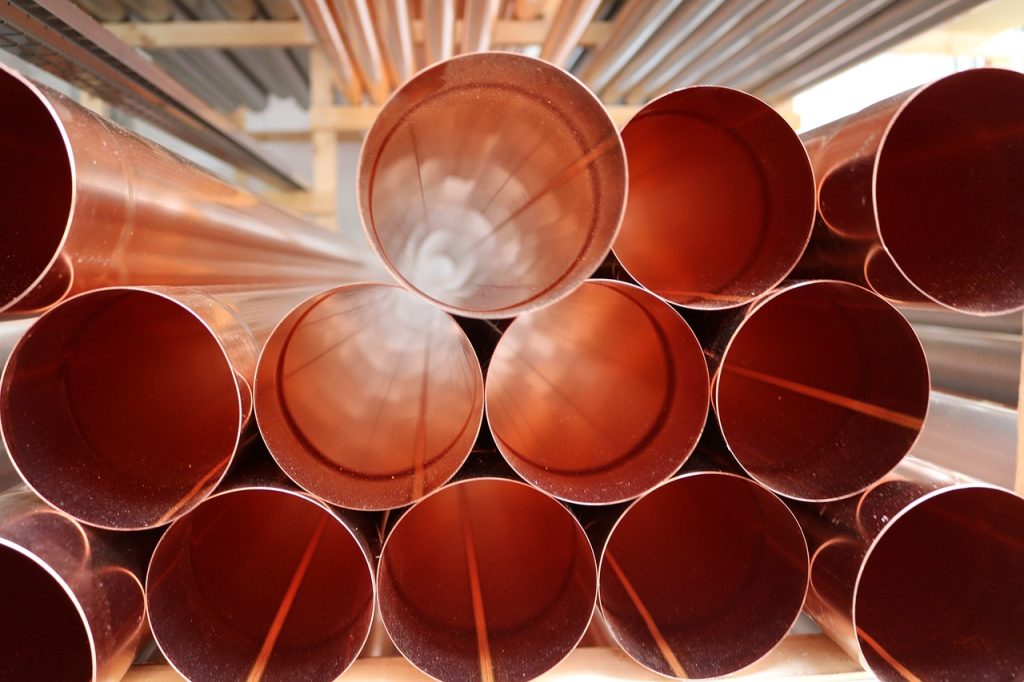Discovering the Diverse Applications of Copper Products in Modern Industries
From improving the performance of electric systems to playing a critical function in eco-friendly power modern technologies, the flexibility of copper is evident. As industries increasingly focus on development and sustainability, the diverse applications of copper warrant a closer assessment, especially regarding their potential influence on future technological improvements and environmental techniques.
Electric Applications of Copper
Copper is a crucial product in the electric sector, making up approximately 60% of the overall need for non-ferrous metals internationally - Copper Products. Its exceptional electric conductivity, which is nearly twice that of light weight aluminum, makes it the recommended option for a variety of electric applications. From electrical wiring systems in domestic and industrial buildings to high-voltage power transmission lines, copper makes sure performance and integrity in electrical energy delivery
In enhancement to electrical wiring, copper is integral to the manufacturing of electrical parts such as electric motors, generators, and transformers. These elements take advantage of copper's thermal conductivity and malleability, important for warm dissipation and reliable efficiency. Copper's resistance to rust enhances the life expectancy and longevity of electric systems, making it a cost-efficient option in the long term.
The development of renewable resource resources, such as solar and wind power, has actually additionally raised the demand for copper in electrical applications. As markets change in the direction of sustainable power solutions, copper's role comes to be also a lot more critical. In general, the versatility and performance attributes of copper strengthen its status as a cornerstone product within the electrical sector, driving development and effectiveness throughout various applications.
Pipes and Piping Solutions
In modern-day pipes systems, the selection of materials significantly influences both capability and long life. Copper has actually become a preferred option as a result of its one-of-a-kind homes, consisting of deterioration resistance and antimicrobial attributes. These qualities make sure that copper piping remains risk-free and durable for delivering safe and clean water, a vital factor to consider in household and business applications.
One of the vital advantages of copper in pipes is its ability to stand up to heats and pressures, making it ideal for a selection of applications, from warm water systems to heating and cooling networks. Furthermore, copper's adaptability enables for much easier installment in intricate piping designs, minimizing the danger of leakages and failings.
One more noteworthy benefit is copper's long lifespan, typically exceeding 50 years with proper maintenance. This longevity not only decreases substitute prices however likewise adds to lasting methods by minimizing waste. Moreover, copper's recyclability straightens with contemporary ecological requirements, promoting a circular economy within the pipes industry.
Copper in Renewable Resource
The adaptability of copper extends past plumbing applications, playing a vital duty in the renewable power industry. In solar panels, copper is made use of in photovoltaic cells and circuitry, helping with reliable energy conversion and transmission.

In addition, as the global demand for electrical cars (EVs) increases, copper's function in battery systems and charging facilities becomes much more substantial. The product's ability to conduct electricity effectively is important to the Full Article efficiency of EV batteries, boosting range and charging speed.
Copper's Duty in Electronics
Electronic devices producing depends heavily on copper's phenomenal properties, especially its high electrical conductivity and thermal efficiency. These features make copper a suitable selection for a large range of digital parts, including adapters, motherboard, and circuitry. The metal's capability to effectively transmit electric signals guarantees marginal energy loss, which is vital in high-performance digital devices.
Additionally, copper's thermal conductivity plays a substantial role in heat dissipation, safeguarding my website sensitive components from overheating. This is particularly important in modern electronics, where compact designs lead to increased heat generation. Copper is also favored for its malleability and ductility, permitting it to be conveniently shaped into detailed designs that meet the demands of advanced electronic applications.
With the increase of customer electronic devices, telecoms, and electrical automobiles, the demand for copper in the electronics sector proceeds to grow. Therefore, copper continues to be a foundation product in the ever-expanding area of electronic devices.
Innovative Utilizes in Production

One notable application remains in additive production, where copper-based products are used in 3D printing procedures. This permits for the production of light-weight components and complex geometries, specifically in the aerospace and automobile markets. Furthermore, copper's thermal conductivity makes it an ideal choice for warm exchangers, boosting efficiency in industrial cooling systems.
Additionally, the rise of clever production has seen the incorporation of copper in IoT gadgets, where its conductive abilities support advanced sensing modern technologies. In the realm of renewable resource, copper is crucial in the production of solar panels More about the author and wind turbines, assisting in much more efficient energy conversion and distribution.
As industries strive for sustainability and technology, copper's versatility and efficiency proceed to position it as a vital product, driving advancements in manufacturing and contributing to the growth of smarter, more effective products.
Final Thought
In summary, copper items demonstrate exceptional adaptability across different modern-day markets. Copper Products. Their superior conductivity improves electric applications, while deterioration resistance ensures reliability in plumbing. The essential role of copper in eco-friendly energy and its crucial feature in electronic devices emphasize its value ahead of time lasting practices. In addition, ingenious uses in manufacturing highlight copper's flexibility and withstanding value. Jointly, these applications highlight copper's important payment to technological progression and industrial performance in modern society.
From enhancing the effectiveness of electric systems to playing a crucial function in renewable power technologies, the versatility of copper is evident. As industries significantly prioritize development and sustainability, the varied applications of copper warrant a closer exam, particularly concerning their potential effect on future ecological techniques and technical advancements.
The growth of renewable energy resources, such as solar and wind power, has even more enhanced the need for copper in electrical applications. Overall, the versatility and efficiency characteristics of copper strengthen its condition as a keystone material within the electrical industry, driving innovation and performance throughout numerous applications.
The versatility of copper prolongs beyond plumbing applications, playing an important duty in the eco-friendly power industry.